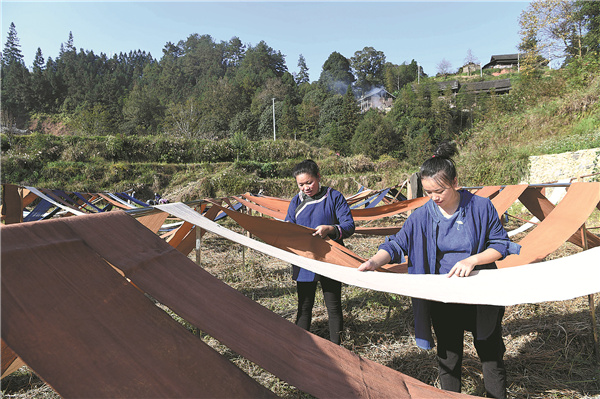

Poverty alleviation
In 2017, Yang's online store's sales reached 761,700 yuan, ranking her business highest in Rongjiang county.
In 2018, she recruited more than 110 villagers and founded the Yishanren cooperative. She moved out of the pigsty-turned-workshop the following year.
In addition to traditional indigo grass, Yang broke ground and explored the use of 70 other plant-based dyes, such as those derived from persimmon and mugwort, adding to the traditional process.
Her efforts saw the cloth receive more attention from the outside market.
In 2021, Yang's online sales broke 2 million yuan, and she was named a model in poverty alleviation by the Guizhou government for helping lift 90 percent of poor households in Fengdeng out of poverty.
To her delight, an increasing number of people in Rongjiang have supported sectors related to the traditional craft.
Yang Xiutang from Lingsuo village, about 3 kilometers from Fengdeng, joined a rural cooperative to grow Strobilanthes cusia (indigo) with support from the county government.
"It never occurred to me that this plant, which used to be found near my home, can be part of an industry that brings us an income," he says.
"Plant spacing should be around 40 centimeters; if it's too dense, the leaves won't grow well, and indigo paste won't be produced," he explains.
Years of growing the plants have given him an adept hand.
"When transplanting, the plants should be placed at a slant, and a bit deeper into the ground," he says.
Rongjiang abounds in Dong and Miao cultural resources, but used to lack an industry focus, according to Wang Fei, a senior county official.
Batik and embroidery are considered among the best showcases of the ethnic culture, while Strobilanthes cusia is an essential raw material for the indigo paste used in the two crafts. The local government started to encourage local residents to scale up their planting in 2018.
In 2022, Rongjiang completed the development of 30 Strobilanthes cusia plantations, each with an area of more than 6.67 hectares. The county can now produce 52,500 metric tons of the plant annually, with a value of over 68 million yuan, benefiting more than 6,300 households, according to the county government.
This year, as the grassroots soccer tournament, the Village Super League in Rongjiang county, also known as cunchao in Chinese, became a national sensation, an increasing number of travelers have beaten a path to Yang Chenglan's place.
The Rongjiang league started in the county on May 13 and concluded on July 29. Featuring 20 teams comprising amateurs from villages from around the country, the competition received more than 30 billion views online.
"The event has helped to attract 20-30 percent more visitors," she says.
She has expanded her facility to offer distinctive homestays, and research and learning experiences. It's expected to generate 1,000 local job opportunities.
"Although the output of traditional Dong cloth is not much, every piece of it can offer the touch of cotton thread, the fragrance of plant dyes, and unique patterns and veins," she says.
"I hope to convey the aesthetic of rural life through Dong cloth, allowing traditional craftsmanship to find a modern context."